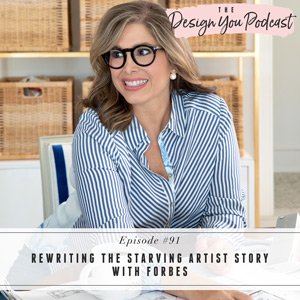
Friends, Tobi Fairley Inc. has been featured in Forbes and I could not be more thrilled. It’s a dream come true, and I thought this would be the perfect time to highlight how our creative endeavors can be money-making machines, and how we creatives can sometimes get stuck in the starving artist mentality.
As I talked about in the article, one of my private clients mentioned how she doesn’t think her work is as valuable as those of her clients who are doctors. Too many of us share the belief that our work as creatives doesn’t matter in the big picture and we discount our contribution to the world. This is a huge problem. So this week, I want to show you why your work is important, and how to start thinking about monetizing your craft in a new way so that you can get out of this mentality.
Listen in this week as I show you why kicking the starving artist mentality to the curb is so crucial to your success. I am on a mission to rewrite the story we creatives hold onto, and I’m giving you the tools to see that you can be a millionaire too.
If you want to keep this conversation going, you have to join my free Design You Podcast community on Facebook. We have great conversations over there about the podcast episodes and our podcast guests are in there too! So head on over and I’ll see you there!





